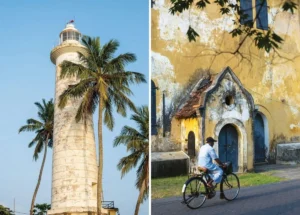Original Article – DestinAsian
A literary celebration in Sri Lanka combines inspiring literature with sharp thought, art programs, and the historic backdrop of Galle Fort.
Photographs by Christopher P. Hill
On a steamy February morning amid the centuries-old townscape of Galle Fort, I sat in on a conversation about Eurocentric beauty standards with Ghanaian-British journalist Afua Hirsch, listened to Colombo-born author Shyam Selvadurai discuss his 2022 historical novel Mansions of the Moon, attended readings by Tamil poets, and joined a “literary lunch” hosted by another eloquent Sri Lankan diaspora author, Razeen Sally. And it wasn’t even halfway through the day. Like thousands of other people swirling about on the fort’s cobbled streets, I was in town to attend the Galle Literary Festival, one of Sri Lanka’s most esteemed cultural events. The four-day program was packed with sessions and activities, and my plan was to attend as many of them as time and sweltering temperatures would allow.
It may be overshadowed on the regional bibliophile circuit by the big-hitting Jaipur Literature Festival—once described by Pico Iyer as “the most carnival-like” of lit fests—but there is an intimacy and zing to Galle’s literary gathering that sets it apart. Founded in 2007 by British-born boutique hotelier Geoffrey Dobbs, the festival has evolved considerably over its 12 editions, shrugging off early criticisms and weathering a pandemic-induced hiatus to emerge as a well-rounded showcase of notable local and diaspora writers alongside a diverse lineup of international talents. No formidable names, mind you, but accomplished, engaging authors and speakers who this year drew upwards of 7,000 attendees to the southwestern shores of Sri Lanka. Combine that with an appreciative and clearly well-read audience, not to mention the small but enthusiastic army of student volunteers who kept the whole thing humming, and there was a wonderful chemistry at work.
Most of the action centered on the suitably storied Galle Fort, a 16th-century Portuguese stronghold that became the island’s main trading port during the subsequent period of Dutch and early British rule over Sri Lanka (then known as Ceylon). Jutting into the Indian Ocean, this architectural gem—a UNESCO World Heritage site since 1988—is more than a backdrop; it’s a character in its own right, a genteelly moldering warren of ramparts and churches, courtyard houses and winding lanes that, while now well populated with tourists, exudes a palpable sense of history.

Festival venues included the Maritime Museum, a former 1671-built Dutch warehouse that straddles Galle Fort’s Old Gate. With its creaking floorboards and high-raftered roof of terra-cotta tiles, one of the building’s upper galleries provided an atmospheric location for conversations about sustainable wildlife tourism, South Asian representation in children’s literature, and a particularly moving examination of Vietnam’s postwar legacy by American photographer Catherine Karnow and Vietnamese novelist Nguyen Phan Que Mai. The hall was invariably packed, the audience rapt.
Elsewhere, there were book signings at the pop-up Sarasavi Bookshop inside the Public Services Sports Club, a low, mustard-yellow building near the Old Gate that served as the festival’s nerve center. At the beachside park across the road, slam poetry and jam sessions were staged under a canopy of palms alongside craft stands selling local art, jewelry, and handicrafts. And clusters of people congregated around the courtyard of a beautiful old villa at 10 Leyn Baan Street, another hub of festival action. Next door, petitioners and black-suited lawyers buzzed around the entrance to the bare-bones Magistrate’s Court. Here, though, the emphasis was on musical workshops, art viewing, and barista-poured flat whites or iced lattes at the local outlet of Colombo’s Kāffi coffee shop.
The wider Galle area also hosted events. The festival’s welcome party had unfolded in the fairy-lighted gardens of Atapattu Walawwa, an 18th-century manor house and protected monument still occupied by its 10th-generation owners. On the second night there was an informal dinner with visiting authors at a sand-floored beach café called The Shack. Another evening, I made my way to the Doornberg, set on a hill overlooking Galle Fort and the ocean beyond. Originally built by a retired Dutch admiral in 1712, the ocher-hued villa—now a four-suite boutique hotel—was the stage for a reading by Sri Lankan-born British author Romesh Gunesekera from his Booker Prize–shortlisted 1994 debut novel Reef, a lyrical coming-of-age story set against the growing social unrest of 1960s Ceylon.
For those looking to pepper their literary rounds with lighter fare, there were plenty of side events to choose from: tea tastings, say, or guided heritage walks, or a gourmet masterclass by UK food personality and The Pepperpot Diaries cookbook author Andi Oliver.
Running concurrently with the literary lineup was Art Trail, a series of exhibitions, artist-led walks, and discussions curated by Sri Lankan contemporary art platform ARTRA. Among the more compelling shows was Koralegedara Pushpakumara’s “The Brutality Within,” a collection of haunting abstract paintings that examined the trauma of Sri Lanka’s Civil War. One evening, I caught a tuk-tuk to the shiny new Radisson Collection Resort in nearby Talpe for a rooftop cocktail reception hosted by the platform’s founder, Azara Jaleel. The occasion marked the launch of the latest edition of her bimonthly magazine ARTRA, with featured South Asian artists Ali Kazim and Tayeba Lipi on hand to mix and mingle.
And, of course, there were elegant dinners, soirees, and after-parties. On the festival’s penultimate night, a Friday, I headed up to The Sun House hotel just over the road from Doornberg for a bash dubbed Mayhem Past Midnight. The gin and tonics flowed in a courtyard where former DJ and BBC Radio presenter Nihal Arthanayake—who just hours before had been engaged in a probing discussion about Britain’s imperial legacy with Empireland author Sathnam Sanghera—was spinning tracks for a crowded dance floor. There wasn’t any actual mayhem, and noise complaints from neighbors ensured that the festivities didn’t last much past midnight. But it was memorable.
The next edition of the Galle Literary Festival takes place January 22–25, 2026; galleliteraryfestival.com
